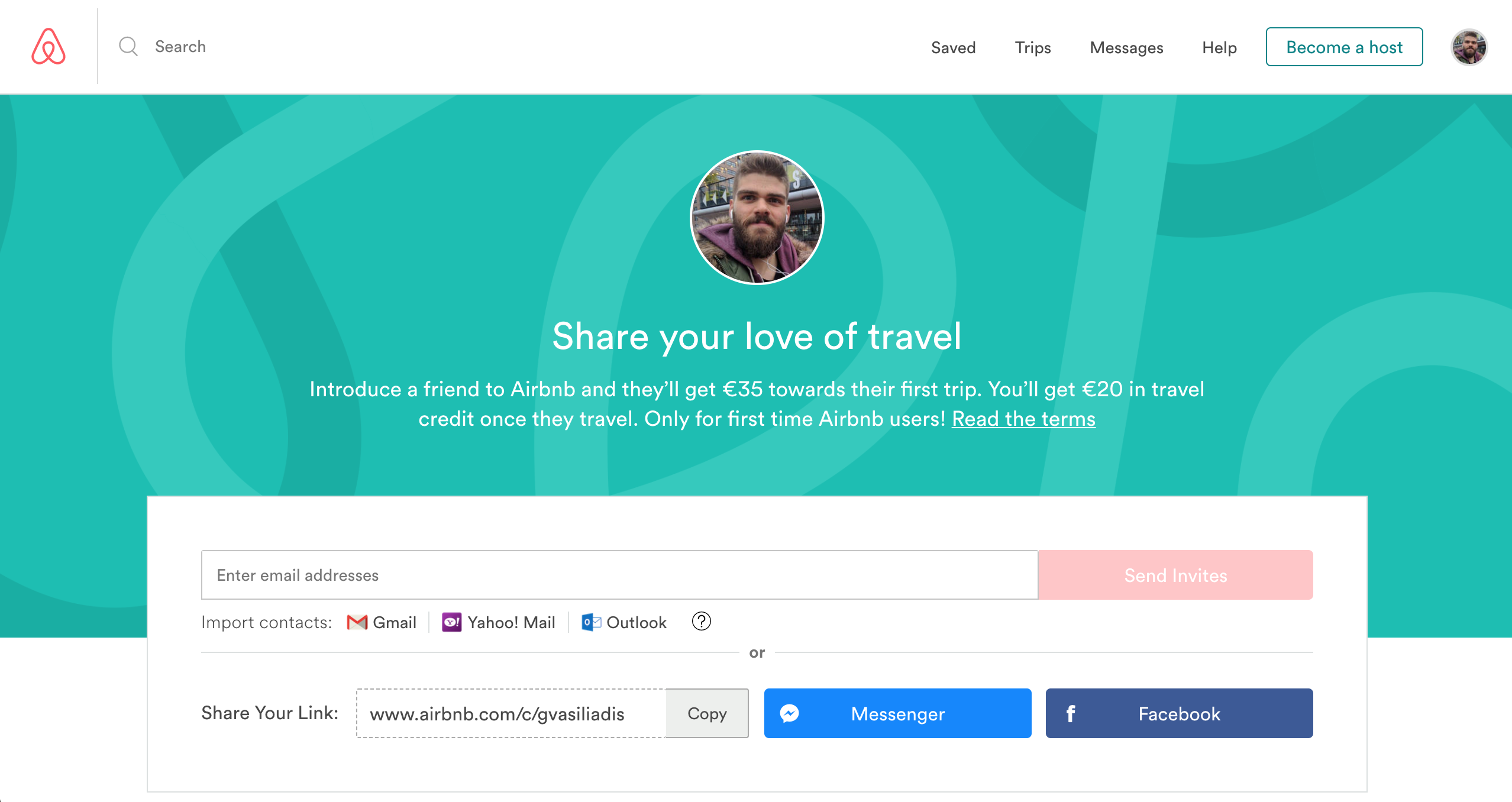Remember when people first started using “google” as a verb?
It’s every startup’s dream—beyond making lots and lots of money, of course.
It’s the arrival. The moment when there’s a universal acceptance that your company as the go-to provider of a product or service…so much so, that people now use your brand as a generic noun or verb.
Pass the Kleenex. Xerox a copy. Relax in the jacuzzi. Enjoy fish and chips with a coke.
And now…paying to stay overnight in a neighborhood flat or borrowing a local family’s rollaway bed while you travel…you’re airbnbing.
So how did this scrappy, born-out-of-necessity, startup make their claim to fame?
For starters, they had a great idea. But everybody’s got an idea, right? What brought Airbnb to billion-dollar status was how they grew that idea, that is, how they increased their number of guest arrivals from 21,000 in 2009 to 80,000,000 in 2016.
It was its well-timed and well-implemented referral marketing program.
Let’s talk about how they did it.

Let your customers do the convincing
So you’ve got a new product, but the world is not knocking down your door to download your app or use your service?
Well, you’re not alone.
Not everyone wants to be an early adopter, and that was certainly the case for Airbnb.
What’s more, when Airbnb launched their service model, they were met with concerns—travels and hosts alike worried if they could trust a stranger.
Jumping that hurdle began with this fundamental insight: a whopping 92 percent of people say that they find recommendations from a peer more compelling than advertising.
We know how powerful word-of-mouth advertising is when used to sell any product or service. But for the services Airbnb offers, the power of a word-of-mouth was be even more critical for accelerating growth.

By building a refer-a-friend-like program that gave experienced customers the mic—along with background checks and a hefty insurance policy—Airbnb could reduce (if not eliminate) those fears, making travelers and their hosts more travel-ready.
Current customers became the trusted brand advocates new customers really want and need to hear from.
As Jason Bosinoff, Airbnb engineering manager, said in an article for Medium, “Airbnb experiences are so personal. People use Airbnb to unlock incredible experiences — anything from weekend getaways with friends, cultural exchanges, and once-in-a-lifetime events like honeymoons.”
And the referral approach is just that…personal.
Go big…and go home
When starting a referral marketing program, everyone has the same question: What will entice people to sign on, sign up and most importantly, to refer others to do the same?
For Airbnb, the answer was simple.
Experiences.
They wanted to build a database of world travelers, ready to rent apartments, rooms, and homes around the globe.
So the home-sharing company incentivized would-be travelers offering travel credits—$25 when a referred friend rented from Airbnb and $75 when a referred friend listed his or her property for rent on the site.
What’s particularly advantageous about this referral marketing tactic is that Airbnb can detract swag hunters simply looking to collect loot or swag and instead, increase referrals of people who would actually travel. ✈

Travelers who participate in the program can earn up to $5000 worth of lodging fees they can use to try out the service.
That’s certainly enough to pay for lots of mini-breaks weekends.
It’s up to the traveler to decide whether to spend these credits as they are earned, or save them up and use all at once.
Sounds really awesome to a traveler, doesn’t it?
For Airbnb, however, the approach was a little risky.
Here’s why…
To offer these travel incentives, Airbnb had to open up their wallet and pay some cold-hard-cash. When a traveler got a credit for accommodations, Airbnb still had to pay the host.
With this double-sided reward model, Airbnb was (and still is) putting their money where their mouth is betting that once customers try their service, they’ll return. Otherwise, Airbnb is just tossing money out the window.
If you’re confident in your product or service model — as Airbnb was — taking this sort risk just might be worth it, as the reward can be so sweet.
BTW if you want to build a referral marketing program similar to Airbnb, we have a video tutorial about it:
Know your bullseye and keep score
Before you launch a referral program, you need to set a realistic goal and identify metrics that you’ll use to measure success or failure.

Airbnb made sure they were aiming at a reasonable target by first running a closed beta test of its referral marketing program.
To start, Airbnb offers the travel credit incentives for referrals only to their existing 2,161 existing members.
The result? 2,107 new members joined, this nearly 1:1 growth ratio was a clear indication that this program would be a likely success.
From there, Airbnb identified six specific metrics to track, including:
- Number of monthly active users sending invites
- Number of invites per inviter
- Conversion rate to new user
- Conversion rate to new guest
- Conversion rate to new host
- Revenue impact potential
They looked at their growth in these areas historically (before the referral program) to see what they could reasonably expect from this program.

The results determined that the Airbnb team could expect their numbers in these categories to increase anywhere from 20 to 90 times their current standings.
This range provided a way to decide if the live referral program was successful in their attempts at bolstering their business through referral marketing.
To see how their actual performance measured against their projection, Airbnb tracked growth every step, A/B testing new content and landing pages and using customized dashboards to make the information accessible.
And Airbnbers surely delighted in watching the numbers climb, as we know now exactly how successful this effort proved to be.
Ultimately, what Airbnb is trying to do is build a community of travel-loving followers. And their referral program is only one of the ways they are making “airbnbing” a choice preferable to booking some boring old hotel room.

